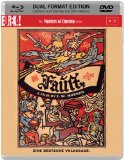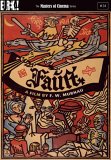 FAUST (Masters of Cinema) (DVD & BLU-RAY DUAL FORMAT) | Blu Ray | (18/08/2014)
from £13.35
| Saving you £6.64 (49.74%)
| RRP
FAUST (Masters of Cinema) (DVD & BLU-RAY DUAL FORMAT) | Blu Ray | (18/08/2014)
from £13.35
| Saving you £6.64 (49.74%)
| RRP Shot in the UFA studios with a big movie star in the lead and all the special effects and production design resources any blockbuster of its time could wish for, FW Murnau's 1926 Faust represents a step up from his better-known Nosferatu. Oddly, Faust is a less familiar film than the vampire quickie and this release affords fans a chance to see what Murnau can do with an equally major fantasy story. Adapted neither from Marlowe's play Dr Faustus nor Goethe's verse drama, the script scrambles various elements of the legend and presents a Faust (Gosta Ekman) driven to summon the Devil by despair as a plague rages through the town, desperate to gain enough learning to help his neighbours. When this deal doesn't quite work out, because he is stoned by townsfolk who notice his sudden fear of the cross, Mephisto (Emil Jannings) offers Faust instead renewed youth and an opportunity to seduce a famously beautiful Italian noblewoman and then to return to his home village and get involved with the pure Gretchen (Camilla Horn). Like most versions of the story, it's episodic and some sections are stronger than others: the great stuff comes in the plague and initial deal sequences, though it picks up again for the tragic climax as Gretchen becomes the central figure and suffers horribly, freezing in the snows and burning at the stake. Jannings' devil, a gruesomely humorous slice of ham, is one of the great silent monster performances, reducing everyone else to a stick figure, and Murnau faces the challenge of topping his Nosferatu imagery by deploying a battalion of effects techniques to depict the many magical journeys, sudden appearances and transformations. On the DVD: Often seen in ragged, incomplete prints projected at the wrong speed, this is a decently restored version, running a full 115 minutes with a complete orchestral score. The original materials show some of the damage to be expected in a film of its vintage, but the transfer is excellent, displaying the imaginative art direction and camerawork to superb advantage. Aside from a nicely eerie menu, the sole extra is a full-length commentary originating in Australia: written by historian Peter Spooner but read by narrator Russell Cawthorne (who mispronounces the odd name). This provides an interesting wealth of background detail, such as Murnau's attempt to cast Hollywood's Lillian Gish as Gretchen, and delivers a balanced assessment of the film itself. --Kim Newman
![Waxworks [Das Wachsfigurenkabinett] (Masters of Cinema) Blu-ray Edition](/pictures/1152998.jpg) Waxworks | Blu Ray | (09/11/2020)
from £12.15
| Saving you £N/A (N/A%)
| RRP
Waxworks | Blu Ray | (09/11/2020)
from £12.15
| Saving you £N/A (N/A%)
| RRP Waxworks [Das Wachsfigurenkabinett] was the final film Paul Leni directed in Germany before striking out for Hollywood and making such classic works of genre filmmaking as The Cat and the Canary, The Man Who Laughs, and The Last Warning. Its sophisticated melding of genres was in fact what inspired Universal's Carl Laemmle to invite Leni to come to Hollywood in the first place, as Laemmle was hoping to capitalise on the emerging comedy-horror craze of the 1920s. Yet Waxworks is, at heart, a pure example of German expressionism. Its stylised sets (designed by Leni), fantastical costumes, chiaroscuro lighting, and startlingly bold performances are paragons of the cinematic movement, and contribute heavily to the film's lasting appeal. The three separate episodes of Waxworks are united by the character of a young poet (William Dieterle), who is hired by the owner of a wax museum to create backstories for a trio of the museum's figures: Caliph Harun al-Rashid (Emil Jannings), Ivan the Terrible (Conrad Veidt), and Jack the Ripper (Werner Krauss). The stories are depicted in succession (one per episode), the poet casting himselfas well as the daughter of the wax museum's ownerat the centre of each tale. Though the poet and the daughter play different characters in the corresponding plots, they are always lovers whose relationship is threatened by the personages of the wax figures. As there is no surviving original negative of Waxworks, this newly restored editiona joint effort by the Deutsche Kinemathek and Cineteca di Bologna, L'Immagine Ritrovata (with funding from the German Commission for Culture and the Media)is composed of contemporary prints and additional film materials from archives around the world. The elements, including English intertitles, were scanned in 4K resolution and then restored in 2K. Presented by The Masters of Cinema Series and Flicker Alley in a special Blu-ray edition, there is an option of two new scores to accompany the film: one by the Ensemble Musikfabrik (commissioned by ZDF/ARTE), and the second by composer Richard Siedhoff. Features: Limited Edition O-Card slipcase [First Print Run of 2000 copies ONLY] 1080p presentation on Blu-ray from a new 2K restoration Option of two newly created scores, by Ensemble Musikfabrik; and composer Richard Siedhoff Audio commentary with Australian film and arts critic Adrian Martin Paul Leni's Rebus-Film Nr. 1-8 Courtesy of Kino Lorber, these Leni-helmed cinematic crossword puzzles were originally screened in 1920s German cinemas as featurettes accompanying the main film. Each of these animated shorts was split into two partsa clue and an answerand presented before and after the visual presentation In search of the original version of Paul Leni's Das Wachsfigurenkabinett' An interview with Julia Wallmüller (Deutsche Kinemathek) based on her presentation after the premiere of the restored film at Il Cinema Ritrovato festival in Bologna 2020 Kim Newman on Waxworks An in-depth, on-camera interview with journalist, film critic, and fiction writer Kim Newman about the legacy of Waxworks PLUS: A collector's booklet featuring new essays by Philip Kemp and Richard Combs on the film's history and significance; notes on the restoration process by the Deutsche Kinemathek; and rarely seen production photographs and promotional material
 Faust | DVD | (26/06/2006)
from £N/A
| Saving you £N/A (N/A%)
| RRP
Faust | DVD | (26/06/2006)
from £N/A
| Saving you £N/A (N/A%)
| RRP Murnau's last German film features astonishing photography magnificent art direction and special effects which retain the power to amaze. Freed from the constraints of psychological narrative Murnau's mastery of cinematic technique places Faust at the pinnacle of the silent era its barrage of visceral and apocryphal imagery contrasting with the simplicity and directness of its spiritual theme. Faust's tale is a classic one of a man who sells his soul to the devil. In an attempt
![Faust [1926]](/pictures/1012911.jpg) Faust | DVD | (21/01/2002)
from £20.00
| Saving you £-0.01 (N/A%)
| RRP
Faust | DVD | (21/01/2002)
from £20.00
| Saving you £-0.01 (N/A%)
| RRP Shot in the UFA studios with a big movie star in the lead and all the special effects and production design resources any blockbuster of its time could wish for, FW Murnau's 1926 Faust represents a step up from his better-known Nosferatu. Oddly, Faust is a less familiar film than the vampire quickie and this release affords fans a chance to see what Murnau can do with an equally major fantasy story. Adapted neither from Marlowe's play Dr Faustus nor Goethe's verse drama, the script scrambles various elements of the legend and presents a Faust (Gosta Ekman) driven to summon the Devil by despair as a plague rages through the town, desperate to gain enough learning to help his neighbours. When this deal doesn't quite work out, because he is stoned by townsfolk who notice his sudden fear of the cross, Mephisto (Emil Jannings) offers Faust instead renewed youth and an opportunity to seduce a famously beautiful Italian noblewoman and then to return to his home village and get involved with the pure Gretchen (Camilla Horn). Like most versions of the story, it's episodic and some sections are stronger than others: the great stuff comes in the plague and initial deal sequences, though it picks up again for the tragic climax as Gretchen becomes the central figure and suffers horribly, freezing in the snows and burning at the stake. Jannings' devil, a gruesomely humorous slice of ham, is one of the great silent monster performances, reducing everyone else to a stick figure, and Murnau faces the challenge of topping his Nosferatu imagery by deploying a battalion of effects techniques to depict the many magical journeys, sudden appearances and transformations. On the DVD: Often seen in ragged, incomplete prints projected at the wrong speed, this is a decently restored version, running a full 115 minutes with a complete orchestral score. The original materials show some of the damage to be expected in a film of its vintage, but the transfer is excellent, displaying the imaginative art direction and camerawork to superb advantage. Aside from a nicely eerie menu, the sole extra is a full-length commentary originating in Australia: written by historian Peter Spooner but read by narrator Russell Cawthorne (who mispronounces the odd name). This provides an interesting wealth of background detail, such as Murnau's attempt to cast Hollywood's Lillian Gish as Gretchen, and delivers a balanced assessment of the film itself. --Kim Newman
![Waxworks [DVD] [1924] [US Import]](/pictures/1154622.jpg) Waxworks | DVD | (05/10/2004)
from £N/A
| Saving you £N/A (N/A%)
| RRP
Waxworks | DVD | (05/10/2004)
from £N/A
| Saving you £N/A (N/A%)
| RRP 
Please wait. Loading...
This site uses cookies.
More details in our privacy policy